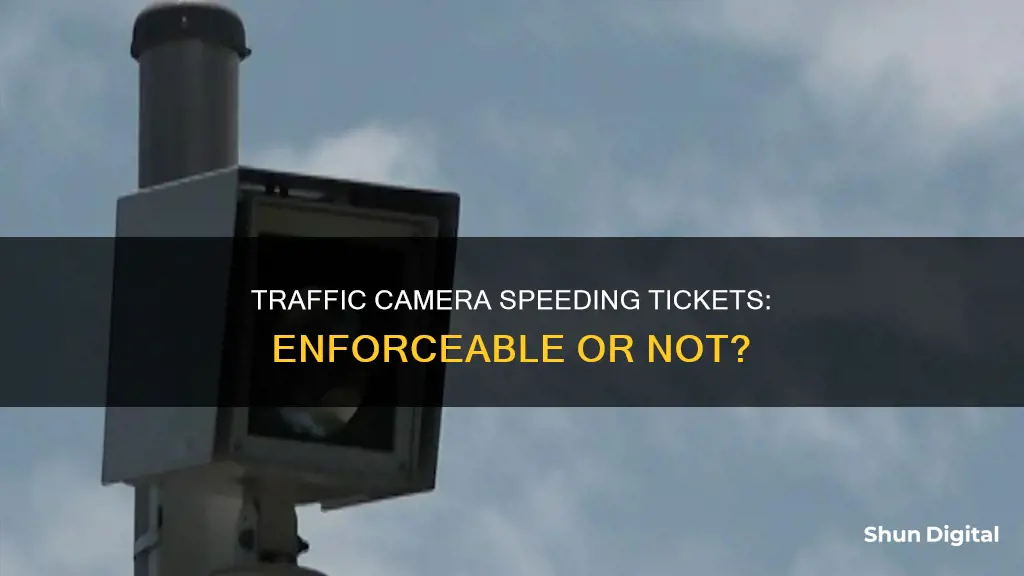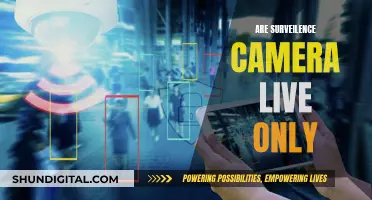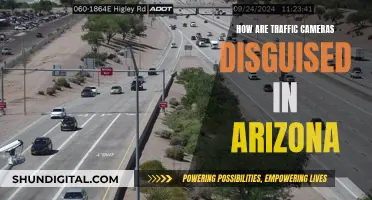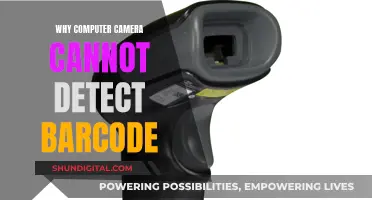
Traffic cameras are an increasingly common feature across US roads, with many states enacting legislation permitting, limiting, or prohibiting their use. These cameras are typically used to enforce traffic laws, such as red-light running and speeding, and can result in tickets and fines for drivers. While some states prohibit the use of automated cameras to catch traffic violators, others allow them with certain restrictions, such as limiting their use to school or construction zones. This has led to questions about the enforceability of these tickets, with some attorneys contesting the constitutionality of these automated citations.
| Characteristics | Values |
|---|---|
| Use | Catching traffic violations, including speeding, failing to pay tolls, not stopping for school buses, disobeying railroad crossing signals, and running red lights |
| Function | Detect and record traffic violations |
| Types | Red light cameras, speed cameras |
| Red Light Camera Function | Captures date, time, location, and license plate number of vehicle |
| Speed Camera Function | Captures speed, details of violation, and license plate number of vehicle |
| Legality | Varies by state; some states prohibit their use, some don't address their use, and many permit their use with restrictions |
| Restrictions | Limited to certain areas, such as school or construction zones; warning signs must be posted; minimum duration of yellow light at intersections |
| Citation Process | An officer or other person reviews the footage and decides whether to issue a ticket; citation mailed to registered owner of vehicle |
| Citation Contents | Information on fine and options for dealing with ticket, including payment and contest instructions |
| Fines | Generally less severe than for non-camera citations, typically $100 or less |
| Demerit Points | In some states, camera-issued tickets do not lead to demerit points, while officer-issued tickets for the same violation do |
What You'll Learn
- Traffic camera tickets are mailed to the registered owner of the vehicle
- The owner can then sign a declaration to indicate they were not driving
- Traffic camera fines are generally $100 or less
- In some states, camera-issued tickets don't result in demerit points
- Some states prohibit the use of traffic cameras altogether

Traffic camera tickets are mailed to the registered owner of the vehicle
Traffic camera tickets are typically mailed to the registered owner of the vehicle within 10 to 90 days of the violation. The ticket will be sent to the address associated with the vehicle on file with the Department of Motor Vehicles (DMV). The ticket will include information such as the dollar amount of the fine, photo evidence, a copy of the traffic citation, and instructions on how to challenge the ticket.
In most cases, the registered owner of the vehicle is presumed to be the driver at the time of the violation. However, if the registered owner was not the driver, they may have the option to provide evidence to dispute the ticket. For example, they may submit an affidavit stating the name and address of the person who was driving, or a police report if the vehicle was stolen. In some jurisdictions, submitting a sworn affidavit may be sufficient to have the ticket dismissed, while in others, the defendant may be required to appear in court.
It is important to note that the laws and procedures regarding traffic camera tickets may vary by jurisdiction. For example, in California, the driver of the vehicle is responsible for a red light photo ticket, not the owner of the car. However, the ticket is still mailed to the address of the registered owner. If the photo evidence shows that someone else was driving, the ticket can be contested, although it is recommended to hire an attorney to assist with this process.
Ignoring a traffic camera ticket can result in high fines or other legal consequences. Therefore, it is important to respond promptly and take the necessary steps to resolve the issue, whether that involves paying the fine or challenging the ticket if there are valid grounds to do so.
Focusing a Studio Camera: The Ultimate Guide
You may want to see also

The owner can then sign a declaration to indicate they were not driving
In most cases, the owner of the vehicle is presumed to be the driver when a citation is issued. However, the laws of most states allow the owner to provide evidence that they were not driving at the time of the violation. This can be done by signing a declaration or affidavit stating that another person was driving the vehicle.
The process for disputing a traffic camera speeding ticket varies by jurisdiction, but generally, the registered owner of the vehicle will receive a citation in the mail within a certain period after the alleged violation. The owner will then have a specified amount of time, usually 30 days, to respond to the citation.
If the owner was not the driver at the time of the violation, they can provide a sworn affidavit or declaration stating the name and address of the person who was driving. This information can be submitted to the court, and in some cases, it may be sufficient to have the citation dismissed. In other cases, the owner may be required to appear in court to dispute the ticket.
It is important to note that the specific procedures and requirements for disputing a traffic camera speeding ticket may vary depending on the location and the governing laws. Therefore, it is advisable to review the relevant laws and regulations or seek legal advice to understand the specific process that needs to be followed.
By providing a declaration or affidavit, the vehicle owner can assert their rights and protect themselves from unjust penalties. It ensures that only the responsible party is held accountable for the traffic violation, promoting fairness and accuracy in the enforcement of traffic laws.
The Always-On Patrol Car Cameras: Privacy Implications
You may want to see also

Traffic camera fines are generally $100 or less
Traffic camera fines vary depending on the jurisdiction and the nature of the violation. In most cases, fines for traffic camera citations are relatively low, typically $100 or less. These fines are generally not considered criminal offenses and do not result in demerit points on the offender's driving record.
The fines for speeding violations captured by traffic cameras usually depend on how far above the speed limit the driver was traveling. For example, in some jurisdictions, the fine for speeding 11-15 mph over the limit is $50, while speeding 16-25 mph over the limit incurs a $100 fine. Fines continue to increase for higher speeds, with some jurisdictions imposing a $200 fine for traveling 20 mph over the limit or a $500 fine for speeds of 100 mph or more.
In addition to speeding violations, traffic cameras are also used to enforce other road rules, such as running red lights, toll evasion, or unauthorized use of bus lanes. The fines for these violations can vary, but they are typically in the range of $50 to $200, depending on the specific jurisdiction and the nature of the offense.
It's important to note that while traffic camera fines are generally lower than traditional traffic citations, there can still be consequences for failing to pay them. If an individual ignores the fine and all reminders, law enforcement authorities may take further action, such as issuing an enforcement warrant. This could result in additional costs and legal repercussions.
Furthermore, while traffic camera fines might not result in demerit points, they can still impact an individual's driving record and, in some cases, their insurance rates. The impact on insurance rates can vary by state and insurance provider, so it's essential to understand the specific laws and regulations in your area.
Surveillance Cameras: Dying, but Why?
You may want to see also

In some states, camera-issued tickets don't result in demerit points
The use of traffic enforcement cameras varies across different states and jurisdictions. While some states prohibit their use entirely, others allow them but impose restrictions on their use. For example, Texas allows red light cameras by city ordinance but prohibits speed cameras.
In some states, camera-issued tickets do not result in demerit points. This is because the camera cannot identify the driver, so the ticket is issued to the owner of the vehicle. As a result, the violation is typically not added to the driver's record and does not affect insurance rates. However, the owner of the vehicle is still responsible for paying the fine.
In Ontario, for instance, the province's Automated Speed Enforcement (ASE) system captures the speed of passing vehicles and issues tickets accordingly. While the system does not identify the driver, it records the vehicle's license plate, make, and model, as well as the direction of travel. A provincial offence officer then reviews the information and issues a ticket to the registered owner of the vehicle.
Similarly, in other jurisdictions, such as Minnesota, Idaho, and Michigan, camera-issued tickets generally do not result in demerit points. However, it's important to note that specific laws and regulations may vary by state and local area.
Mastin Labs and Adobe Camera Raw: A Perfect Match?
You may want to see also

Some states prohibit the use of traffic cameras altogether
The use of traffic cameras to enforce speeding violations is a highly controversial practice. While many states use these cameras for enforcing traffic laws, several states prohibit their use altogether.
Arkansas, for instance, prohibits the use of traffic cameras except in limited circumstances, such as school zones, railroad crossings, and highway work zones when a police officer is present. Similarly, Mississippi bans the use of automated recording equipment for traffic enforcement, and Montana prohibits the use of automated enforcement systems to issue tickets.
New Mexico bans traffic cameras on state and federal roads, although localities within the state, such as Albuquerque, may use them. Texas also prohibits the use of red-light and speeding traffic enforcement cameras, and Utah prohibits speed camera use.
In addition to these states, South Dakota, Wisconsin, and West Virginia also prohibit the use of traffic cameras for enforcing speeding violations.
Charging the A7 Camera: A Step-by-Step Guide
You may want to see also
Frequently asked questions
It depends on the state. Some states prohibit the use of traffic cameras to catch speeders, while others allow them with certain restrictions.
Speed cameras are often placed in high-risk areas such as school zones, work zones, residential neighborhoods, and construction sites.
You can either pay the fine or contest the citation in court or in writing. Many states allow the registered owner of the vehicle to sign a declaration indicating that they were not the driver at the time of the alleged violation.







